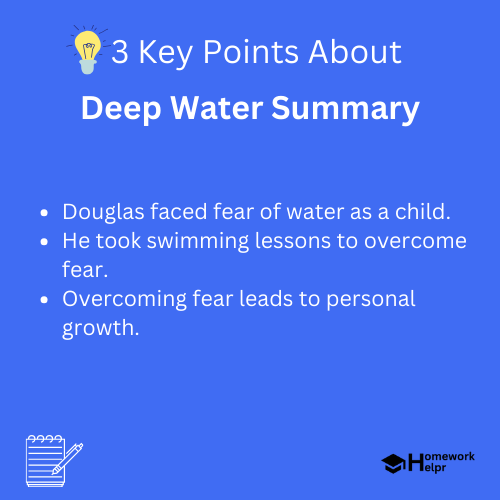📝 Summary
“Deep Water,” authored by William O. Douglas, narrates his lifelong struggle with the fear of water stemming from a traumatic childhood incident. This autobiographical tale explores overcoming fear through resilience and personal growth. Douglas, once terrified of swimming, decides to face his fears by taking swimming lessons at a local YMCA. His journey transforms water from an enemy to a place of solace, revealing the importance of confronting fears for self-discovery and empowerment. Ultimately, Douglas imparts valuable lessons on courage, challenge, and reflection that resonate through generations.
Deep Water Summary
‚ÄúDeep Water,” written by the renowned author William O. Douglas, is a compelling narrative that takes readers on an emotional journey of fear, resilience, and self-discovery. This vivid tale recounts the author‚’ lifelong struggle with the fear of water following a traumatic experience during childhood. The story is primarily autobiographical, serving as a vehicle for Douglas to explore the themes of overcoming fear and achieving personal growth.
The Encounter with Fear
The narrative begins with a defining moment in Douglas’s life where he was just a young boy. During a visit to a swimming pool, he ventured into the water, only to experience a disheartening incident that left him terrified. He describes how he was pulled under by a larger boy, and despite his desperate struggles and gasping for air, he felt the understanding of how vulnerable one can be beneath the surface of the water.

This encounter instilled a fear of water within Douglas that lasted for many years. He avoided swimming and water-related activities, which meant missing out on the joys of summer fun. This fear dominated his life, making any interaction with water a terrifying ordeal.
Definition
Fear: An emotional response to a perceived threat or danger.
Overcoming the Challenge
As Douglas matured, he recognized that the fear that had haunted him throughout his childhood was no longer a healthy part of his life. Determined to reclaim his life, he presented himself with a challenge to face his fear head-on. He decided to take swimming lessons to conquer his apprehension and connect with the deep waters he had long avoided.
Douglas’s journey began at a local YMCA swimming pool. He started with basic swimming techniques and persisted through multiple sessions. With every lesson, he felt a growing sense of confidence. This gradual exposure was crucial in his path towards understanding and appreciating the water rather than fearing it.
Examples
For instance, in one of his first lessons, Douglas couldn’t manage to float easily. But after several attempts with the help of his instructor, he finally managed to float, which marked a significant turning point in his journey.
Realization and Transformation
This learning curve allowed Douglas to realize that water was not an enemy but a medium to experience joy and freedom. He developed a strong affinity for swimming, eventually mastering various techniques and skills that once terrified him. The more he swam, the deeper his understanding of water became, leading to a profound sense of tranquility.
As Douglas embraced swimming, he began taking longer and deeper dives into natural waters like rivers and lakes. The once-chilling depths became a place of solace and reflection, transforming into a liberating experience instead of a source of fear. Swimming became a symbol of empowerment, leading to his newfound appreciation of life.
❓Did You Know?
Did you know that professional swimmer Michael Phelps has won more Olympic gold medals than any other athlete in history, showcasing the immense benefits and joy of swimming?
The Broader Impact of Fear
Douglas‚’ narrative extends beyond personal struggles; it explores the impact of fear on an individual‚’ life. He delves into how fear can inhibit personal growth and limit experiences. He encourages readers to confront their fears rather than run from them, suggesting that self-reflection and gradual exposure are powerful pathways to overcoming challenges.
Throughout the story, Douglas uses his experience to impart valuable life lessons. Some pivotal lessons include:
- Courage is not the absence of fear but the ability to push through it.
- Facing challenges head-on can lead to unexpected rewards and personal growth.
- Reflection on one‚’ experiences is essential in navigating life‚’ obstacles.
Definition
Self-reflection: The process of examining one’s thoughts, feelings, and motivations to gain insight into oneself.
Conclusion
‚ÄúDeep Water” is not just about overcoming the fear of swimming; it is an inspiring story of resilience, growth, and bravery. William O. Douglas teaches us that life is filled with challenges that can be daunting, but they are also opportunities for self-discovery and triumph. His life journey encourages readers to face their fears and to transform challenges into stepping stones toward fulfillment and peace.
The lessons learned from Douglas’s narrative resonate across generations, reminding us that it‚’ never too late to challenge ourselves. Confronting our fears can lead to new adventures and a more enriching life experience.
Related Questions on Deep Water Summary
What is the main theme of Deep Water?
Answer: Overcoming fear and personal growth
Who is the author of Deep Water?
Answer: William O. Douglas
How did Douglas confront his fear of water?
Answer: By taking swimming lessons
What life lesson does Douglas emphasize in the narrative?
Answer: Face fears for self-discovery and empowerment.
